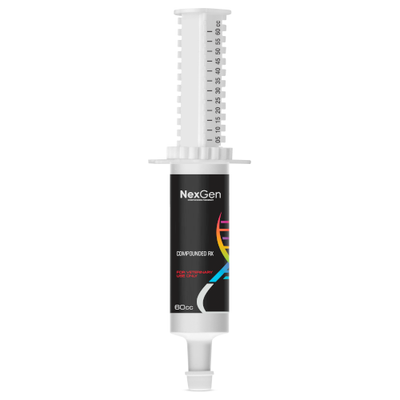
Lactanase 100 mg/mL, Oral Paste, 60mL Syringe
Login for pricing
- Brand
- Mixlab
- SKU:
- NC-0258
- Product Type:
- Paste
- Size:
- 60ml
- Administration:
- Oral
Fatigue is a normal consequence of exercise that is continued at high intensity or for prolonged periods of time.1 Horses that become fatigued will either stop exercising or continue exercising, but at a lower intensity. This is obviously a significant concern in the realm of performance horses. The occurrence of fatigue typically differs according to the type of exercise the horse is performing,2 thus the onset of fatigue in racing horses is a different phenomenon physiologically to fatigue in horses performing with low intensity but for long durations.
A great deal of data concerning fatigue in animals has been derived from horse studies because horses can be trained to exercise on high-speed treadmills that allow investigation of respiratory, cardiovascular, and metabolic responses.1 When a horse becomes fatigued, it is unable or unwilling to maintain the same speed as the treadmill when the treadmill speed is increased. Changes in the gait and joint movements are seen, and these changes may be an important factor contributing to musculoskeletal injuries of racehorses.1,2
Fatigue in Horses and its Effects
Fatigue during high-intensity exercise will depend on the duration and energy demands of an event. Endurance events can last for hours or days, while many Quarter Horse, Standardbred and Thoroughbred races demand intense exercise at maximal speeds lasting 3 minutes or less.1,2 In cases of fatigue during prolonged exercise, heat is generated within the horse’s body. The body tries to cool off by sweating, which can result in dehydration and metabolic disturbances.1 These factors are usually implicated in the fatigue, exhaustion, and even death that can occur after prolonged exercise.1 Environmental factors (e.g., temperature and humidity) also have a major impact on the degree of disturbance to a horse’s bodily fluids during prolonged exercise.
Physical training is the most effective way of reducing fatigue and increasing the capacity for exercise.2 Physical training builds up muscle size and strength and facilitates more oxygen being transported to muscles and more energy produced within the muscle. The available literature states that warmup before competition at high speeds is likely to reduce fatigue in Quarter Horse, Thoroughbred, and Standardbred races, and a 10-minute warmup with trot and canter is recommended whenever possible.1
Lactanase for Horses
Lactanase aids in the proper functioning of the horse's muscles and supports recovery of after strenuous effort. Lactanase has been widely recommended by veterinarians and trainers for racehorses, competition horses, and for any breeds during intensive training. It helps to decrease the accumulation of muscle lactate, delays the process of fatigue and increases resistance in horses which undergo high levels of stress during racing and/or training. Lactanase provides the horse with many of the elements that are useful for the production of both anaerobic and aerobic energy, while optimizing metabolic capacities to guarantee the maximum functioning of the muscles.
Lactanase helps support optimal energy release and muscle function in all classes of horses, but is widely used for performance horses. It supplies nutrients important for the formation of acetyl coenzyme A in the horse's body (Acetyl coenzyme A is the gateway to the Krebs cycle, where the release of cellular energy takes place).
Where to buy Lactanase
Lactanase is available in the U.S. through pharmaceutical manufacturers and through veterinary custom compounding companies. LACTANASE 100 MG/ML Oral Paste by NexGen Pharmaceuticals is a superior supplement for horses engaging in intense activity when the need for energy is greatest.
Active Ingredients
-
Sodium Acetate 64.4 mg/mL
-
Calcium Chloride 2.38 mg/mL
-
Magnesium Chloride 2.56 mg/mL
-
Potassium Chloride 4mg/mL
FOR RX ONLY: A valid prescription from a licensed veterinarian is required for dispensing this medication.
1Merck Veterinary Manual.
2Demirtaş, Berjan & Parkan, et. al. (2015). Exercise-Induced Physiological Fatigue in Horses: Review. Turkiye Klinikleri Journal of Veterinary Sciences. 6. 60-66. 10.5336/vetsci.2016-51263.









